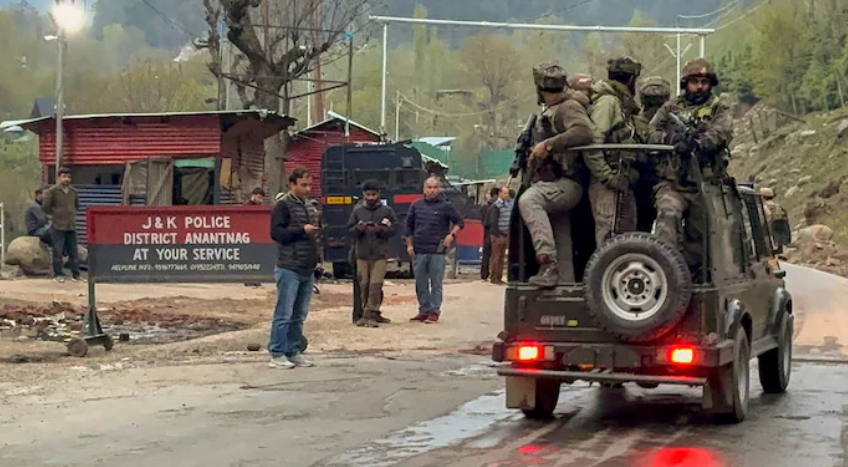Srinagar bishop calls out 'cowardly attack on innocent people' in Kashmir
Twenty-six people, mostly tourists and Hindu pilgrims, were killed yesterday in an attack by a Pakistani terrorist group. The region has long been disputed between India and Pakistan and marked by violence. After revoking Kashmir's special status, Indian Prime Minister Narendra Modi has promoted tourism and religious travel in recent years.
Milan (AsiaNews) - Yesterday afternoon, 22 April, a terrorist attack in the Baisaran Valley, a few kilometres from Pahalgam, in Indian-administered southern Kashmir, killed 26 people, including many tourists. Responsibility for the attack was claimed by The Resistance Front (TRF), a faction linked to the Pakistani terrorist group Lashkar-e-Taiba, which opposes the ‘demographic change’ in the region favoured by the Indian authorities.
Baisaran, located about three kilometres from the renowned tourist resort of Pahalgam, the starting point of the Hindu pilgrimage Amarnath Yatra, has become an increasingly popular destination for Indian tourists in recent years, attracted by its idyllic natural landscapes. The Amarnath Yatra, for which registration opened a few days ago, is scheduled for July and August 2025. According to some sources, the aim of the attack was to spread panic among tourists and pilgrims.
The tragedy in Pahalgam is the bloodiest attack on civilians in the Kashmir region since the Nadimarg massacre in 2003, in which 24 people were killed. In recent years, incidents against civilians have been rare: the last one dates back to last June, when armed men attacked a bus carrying Hindu pilgrims, killing nine people.
'Most of the tourists killed came from different parts of India, including Maharashtra, Karnataka, Haryana, UP, Gujarat, Tamil Nadu, Odisha, the United Arab Emirates, Nepal and Kashmir. This is a cowardly attack on innocent and defenceless tourists. We condemn this attack in the strongest terms. We express our deepest condolences to the families who have lost their loved ones and pray for the repose of their souls. May God grant a speedy recovery to the wounded,’ Bishop Ivan Pereira of Jammu-Srinagar told AsiaNews.
The Indian bishops also condemned the attack: ‘The Catholic Bishops’ Conference of India is shocked and outraged by the cowardly terrorist attack on tourists in Pahalgam, which has resulted in the loss of precious lives and the injury of many,’ reads a press release issued yesterday. ’This brutal act is a grave affront to human dignity and values. We demand that those responsible for this atrocity be brought to justice. We appeal to all those involved in the violence to lay down their arms and embrace the path of peace. Violence only begets more violence, and the time has come to choose the path of love, compassion and understanding.’
The Muslim-majority Kashmir region has been disputed between India and Pakistan since India's independence from British colonial rule in 1947. Since the 1990s, a violent armed separatist insurgency against Indian rule has caused tens of thousands of deaths, involving civilians and security forces. India accuses neighbouring Pakistan of supporting and financing the rebels in an attempt to annex the region, an accusation that Islamabad rejects, claiming that the uprisings reflect the local population's desire to join Pakistan or gain independence.
In 2019, Indian Prime Minister Narendra Modi revoked Kashmir's special status, dividing the state into two territories administered by the central government: Jammu and Kashmir, and Ladakh. Since then, the Delhi government has exercised harsh military repression, in the context of which terrorist attacks have multiplied, to which India has responded with retaliatory measures. After the Pulwama attack in February 2019, in which a police convoy (CRPF) was hit, killing 40 people, Indian armed forces crossed the Line of Control in Pakistani Kashmir, destroying terrorist bases.
Indian Prime Minister Narendra Modi, who was visiting Saudi Arabia, returned to New Delhi today, and Finance Minister Nirmala Sitharaman also ended her trip to the United States and Peru early ‘to stand with our people at this difficult and tragic time,’ she said. Several political parties in Kashmir have called for a strike in response to the attack. Many schools have also suspended classes today.
In recent years, the Modi government has sought to redefine Kashmir's image from a high-risk area to an emerging tourist destination, declaring it a ‘normal’ state. With this in mind, in 2023, India hosted a G20 meeting in Srinagar, the capital of the territory administered by New Delhi, aimed at promoting the region's cultural heritage and boosting its tourist appeal. However, Fernand de Varennes, the UN Special Rapporteur on Minorities, also criticised the initiative, stating that the G20 was ‘unwittingly providing a semblance of support for a facade of normality’, while in reality human rights violations, political persecution and arbitrary arrests were on the rise in the region. As suggested by de Varennes, the Pahalgam massacre shows that normalisation in Kashmir is still far from being achieved.
(with contributions from Nirmala Carvalho)
07/02/2019 17:28
12/02/2016 15:14
11/08/2017 20:05







.png)










